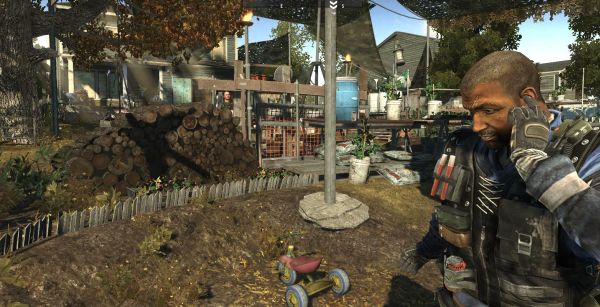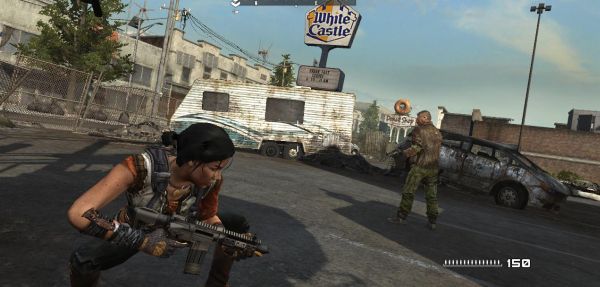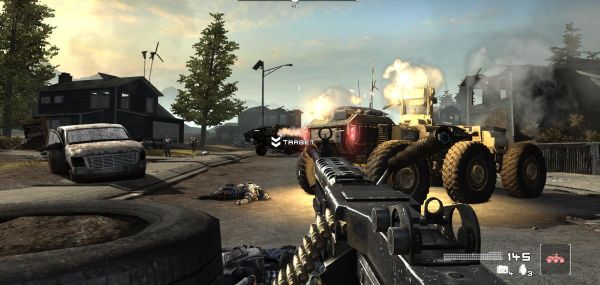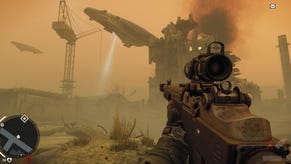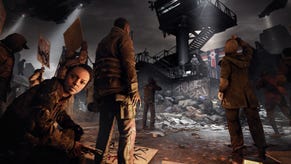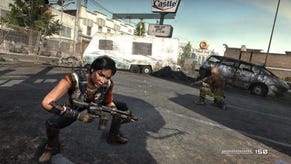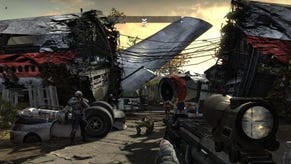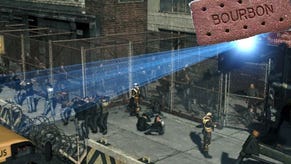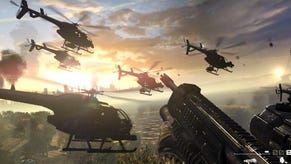Hands On Preview: Homefront
I've been looking forward to Homefront ever since I saw it at E3 in 2009. Along with Just Cause 2, the demo we saw showed a game with a mad sense of catastrophic glee, set in a refreshingly familiar world of suburban cul-de-sacs and department store carparks. Accompanied by a remotely controlled armoured vehicle, Goliath, it looked like it could be the buddy game of the century - just you and your indestructible rolling weapon machine. The narrative intrigued too, by seeming so ludicrous: by 2027 North Korea has invaded and occupied North America, with you playing as part of a group of rebels attempting to overthrow the new leaders. Now having played the first three levels of the game, it's safe to say that all my expectations have been subverted.
Let's start with the premise. It does kind of make sense. It's not quite the simplistic idea that N. Korea's weeny army somehow overthrows the most powerful nation on Earth. Instead we see a surprisingly traumatic potted history of the events from 2011 to 2025 that lead to N.K.'s becoming a seriously huge world power. By the time they're invading the States they're already occupying swathes of Asia, and their merciless attack is enormous and horrendous. A particularly horrifying moment during the opening cutscene shows an unarmed mother and father sat against a wall and shot, immediately in front of their infant son. The toddler screams in terror, running to their dead bodies, tugging at his father's clothing and wailing. There's an emphasis on this being a brutal, shocking war.
Until you start playing. Which so far seems to offer disappointment. Homefront, against my optimistic expectations, appears to be another Modern Warfare clone. In the same way the disappointing Medal Of Honor was another Modern Warfare clone. Which is to say, the first three missions are about running around just behind the action, wondering if you really need to be there.
We're deep in the American suburbs, which is such a stunning location for an FPS game. Beautifully realised, the real-world setting is actually our own real world (or more specifically, a resident of Colorado's real world.) Houses, streets, playgrounds, carparks outside Hooters restaurants... There's an odd mix of real-world commercial enterprises and the usual made up copies. In the first moments of the game you're stood in front of a White Castle, which makes me want a burger. A burger I do not have. It's mystifying that more games haven't done this, and Homefront depicts it exceptionally well.
But the first three levels we've had access to ensure that you are always in last place. At points this becomes so pettily enforced that you start to feel like the hated kid in class, the one who gets pushed and barged out of the way, even by the nicer kids. If there's a trapdoor to jump down, a passage to explore, or even doorway to walk through, your two NPC buddies will literally shove you aside to make sure they get through first. If there's something cool to do, like throw a filing cabinet out of the way, then you just stand there and watch. Want to open a door? Learn your station, scumbag. And tragically, the same counts for cover.
The game has no cover system - it's the old fashioned "hiding behind stuff". But inevitably anywhere useful to crouch will be occupied by one of your companions. And unlike most other games of its ilk, they don't find somewhere else if you try to take the same position. Instead they get territorial and push you back into the line of fire. Not that they're taking advantage of their stolen tactical advantage. In this preview version at least, they will happily stand with their gun barrel touching an enemy's head and not fire. The enemies are compliant, because they're only interested in killing you and not your immortal chums.
This is about following a narrative with a fundamentalist fervour. Deviating from expectations leads to encountering invisible barriers, complete suspension of action, or rudely shouted instructions to hurry up. The screen inevitably is instructing you to "follow" someone, and never lead. Want to climb over a fence lower than the last thing you jumped? No can do - jumping such objects is scripted. Just follow the man, do what he tells you, clear up after their having fun. Manage to get ahead at any point and the others will visibly teleport in front of you, such is their determination that you'll not have a moment of inspiration or imagination.
At one point toward the end of the third level this became completely farcical. We'd reached the top of some stairs to a door blocked by furniture. Only the other guy can move those, because of your character's brittle bone disorder I think. But he won't. Instead we're all just stood up there, staring around. The woman (I'm sure they had names) then turns to face a wall, kneels down, and announces, "I can't go any further." Nor can I, because we're all waiting for the script to finally catch up and radio us a message that gives us permission to open a door. So we wait.
The effect of all this is to reduce the game's battery of set pieces to interactive cutscenes. Sure, it won't end until you've shot enough Koreans in the head, but they'll run in from the same place each time. Two from behind that container on the right, then that bit of scenery crashes down, the guy runs across on fire, and there's two more hiding around the corner to the left. The reason you'll see it enough times to learn the script will either be thanks to sheer bad luck - a grenade landing too near you with your companions blocking your escape, a rocket being fired from a helicopter directly at your face, or quite often seemingly being shot around a corner due to the cover not being based on line-of-sight - or because something somewhere explodes for some reason. I've not been able to figure out what causes that, although I suspect it's going too far ahead. A section of one warehouse exploded each time I followed my buddies through, until the time it didn't. And with checkpoints rather than quicksave, things repeat.
Which is all a massive shame, as it can look spectacular. The world crashing down around you, helicopters blowing up vehicles, and phosphorous weapons setting everyone on fire. But it's hard to see anything but the green streaming numbers of the matrix behind it all. Your job: headshots. The end.
What should really have rescued everything for this early glimpse of the game was the Goliath. A surprisingly small tank-car-thing for its name, it's remotely controlled by some mysterious force, and eagerly charges about like a frantic, metal puppy. It fires its machine gun at the enemies it sees, but otherwise just scampers about. However, you can issue it commands by looking through a special scope and locking onto targets. Click the mouse and Goliath unleashes a barrage of missiles - a most entertaining display of force.
But Goliath was always going to be difficult to manage. Such a weapon in a game is obviously massively powerful, so in order to maintain challenge the game opts for just constantly disabling it. During the very few occasions when it appears from nowhere for you to play with, you'll also get Koreans with EMP weapons putting it out of action. So it ends up being of such limited, occasional use, and so haphazardly involved, that at least in the early stages of the game the exciting potential is not realised. Hopefully that's something that changes as the game goes on.
There's only two more weeks before the game is released, so it's not too likely that many of the frustrations will be fixed in time. Perhaps an early patch will recover a lot of the potential for what really should be a thrilling real-world-set action game. But unfortunately the impression is that the core of the game is that you're to be in last place, huffing and puffing along behind the others (on too many occasions the game forces you to walk at a pace so slowly old grannies would be yelling at you to get a move on, while allowing your NPC's to run ahead), wondering exactly why they brought you along in the first place. "Oh, that's John Walker. They said we had to take him. Um, give him Goliath's controls? It's pretty much automated anyway - it'll let him think he's involved."
In the end it offers quite the opposite of my expectations. The footage I'd seen nearly two years ago had given the impression of being in a real-world playground (sometimes literally), where I could employ my Goliath buddy to execute imaginative warfare in the suburban streets of America. But what I've played so far has been a claustrophobically restrictive corridor shooter in which I felt barely involved. There's every chance this is just a slow beginning, and things pick up dramatically. Goodness knows, THQ have a lot of confidence in the game, already talking about sequels. I hope they've good reason for this. And you know what? I'm convinced by the plot. North Korea reunites with the South, nation exists in peace, US troops withdraw, US economy completely collapses and descends into civil war, UN dissolves, the Greater Korean Republic takes over a weakened Japan, America suffers an epidemic disease, Korea launches trojan horse satellites that wipe out US electricity, and then WAR! With lots else besides.
I wasn't expecting either.
Oh, and what on Earth is wrong with this baby?


